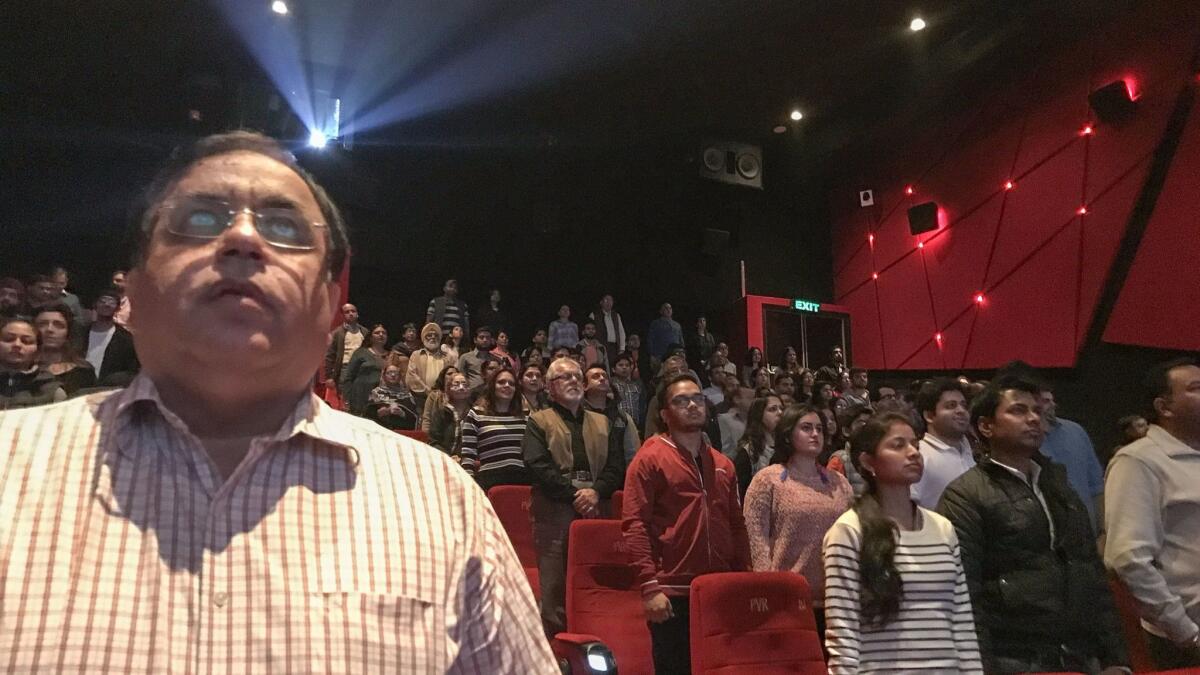In India, 19 moviegoers arrested for failing to stand when national anthem played before film

- Share via
Reporting from Mumbai, India — Nineteen moviegoers have been arrested in southern India this week for violating a new law: They did not stand when the national anthem was played in the theater.
At an international film festival in Kerala state on Monday, 12 people refused to rise for the anthem, prompting a scuffle in which six of them were reportedly assaulted by other patrons.
The 12 were arrested and charged with offenses including contempt of court before being released on bail. No charges were filed against their attackers, police said.
A day earlier in the city of Chennai, formerly known as Madras, seven people took selfies while the anthem was played, leading to an altercation outside the theater with filmgoers who objected to their behavior. Police brought in both sides for questioning before charging the seven with failing to observe the new law.
India’s Supreme Court on Nov. 30 ordered that movie theaters play the national anthem before every screening and that everyone in the theater must “stand up to show respect.” The court was responding to a petition by a retired government official who opposed “dramatization” of the anthem in movies and TV shows, which the judges also ruled was illegal.
It was a striking show of nationalism in a democracy whose constitution enshrines free expression, but the court did not stop there. It said the national flag must be displayed on screen and the auditorium doors closed while the anthem is played, “so that no one can create any kind of disturbance.”
Indian citizens are “duty-bound to show respect” to the anthem and, when it comes to such national symbols, “the perception of individual rights … is constitutionally impermissible,” the judges wrote.
The decision, which went into effect Saturday, immediately provoked arguments between those who view it as an infringement of individual rights and others sympathetic to a surging tide of nationalism in the world’s second-most populous country.
Under the leadership of the conservative Bharatiya Janata Party, or BJP, which is rooted in Hindu nationalist groups, many liberals and religious minorities believe India is growing more hostile to them.
Restrictions on the slaughter of cows, which Hindus regard as a sacred animal, have sparked mob attacks against minority Muslims and others suspected of possessing cow meat. University students who protested the executions of convicted terrorists have been branded by BJP leaders as “anti-national.”
Commentators said the anthem decision would further empower vigilantes.
“Without a doubt, the political climate is getting more restrictive and the right to dissent is being steadily eroded,” said Bhairav Acharya, a lawyer who practices at the Supreme Court.
“In a climate of rising nationalism, it’s easy to predict random violence erupting, whether in small incidents in theaters or in a larger way, which I fear is going to happen at some point.”
BJP leaders have supported the court decision, saying Indians should not allow anyone to disrespect national symbols.
“Those who find fault with the Supreme Court directive on the national anthem should fight it legally rather than insulting it in the street,” the party’s state president in Kerala, Kummanam Rajasekharan, said in a statement.
India has an active film censor board that routinely deletes content it believes to show the country in a poor light. In October, amid rising tension with rival Pakistan, Indian filmmakers agreed to ban Pakistani artists from their productions.
Even before the court order, the national anthem — a century-old paean to Indian pluralism, written by the Nobel laureate Rabindranath Tagore — had become a source of contention.
In October, a filmgoer in the western state of Goa was attacked by a couple sitting behind him when he did not stand for the anthem. The assailants apparently did not realize that their victim, a prominent disabled rights activist named Salil Chaturvedi, used a wheelchair because of a spinal cord injury.
Just before the Supreme Court order went into effect this week, Justice Dipak Misra issued a clarification: Disabled people were exempted from rising for the anthem.
Parth M.N. is a special correspondent.
Follow @SBengali on Twitter for more news from South Asia
ALSO
Battleground Bollywood: India’s film industry targets Pakistan as political tensions rise
What India’s film censors worry about: long kisses, gay themes and now a gritty story about drugs
Controversial student activists turn India’s universities into ideological battlegrounds
More to Read
Sign up for Essential California
The most important California stories and recommendations in your inbox every morning.
You may occasionally receive promotional content from the Los Angeles Times.











